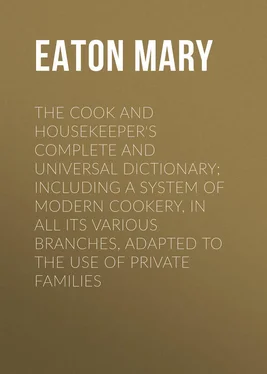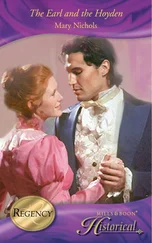Mary Eaton - The Cook and Housekeeper's Complete and Universal Dictionary; Including a System of Modern Cookery, in all Its Various Branches, Adapted to the Use of Private Families
Здесь есть возможность читать онлайн «Mary Eaton - The Cook and Housekeeper's Complete and Universal Dictionary; Including a System of Modern Cookery, in all Its Various Branches, Adapted to the Use of Private Families» — ознакомительный отрывок электронной книги совершенно бесплатно, а после прочтения отрывка купить полную версию. В некоторых случаях можно слушать аудио, скачать через торрент в формате fb2 и присутствует краткое содержание. Издательство: Иностранный паблик, Жанр: foreign_antique, foreign_prose, на английском языке. Описание произведения, (предисловие) а так же отзывы посетителей доступны на портале библиотеки ЛибКат.
- Название:The Cook and Housekeeper's Complete and Universal Dictionary; Including a System of Modern Cookery, in all Its Various Branches, Adapted to the Use of Private Families
- Автор:
- Издательство:Иностранный паблик
- Жанр:
- Год:неизвестен
- ISBN:нет данных
- Рейтинг книги:5 / 5. Голосов: 1
-
Избранное:Добавить в избранное
- Отзывы:
-
Ваша оценка:
- 100
- 1
- 2
- 3
- 4
- 5
The Cook and Housekeeper's Complete and Universal Dictionary; Including a System of Modern Cookery, in all Its Various Branches, Adapted to the Use of Private Families: краткое содержание, описание и аннотация
Предлагаем к чтению аннотацию, описание, краткое содержание или предисловие (зависит от того, что написал сам автор книги «The Cook and Housekeeper's Complete and Universal Dictionary; Including a System of Modern Cookery, in all Its Various Branches, Adapted to the Use of Private Families»). Если вы не нашли необходимую информацию о книге — напишите в комментариях, мы постараемся отыскать её.
The Cook and Housekeeper's Complete and Universal Dictionary; Including a System of Modern Cookery, in all Its Various Branches, Adapted to the Use of Private Families — читать онлайн ознакомительный отрывок
Ниже представлен текст книги, разбитый по страницам. Система сохранения места последней прочитанной страницы, позволяет с удобством читать онлайн бесплатно книгу «The Cook and Housekeeper's Complete and Universal Dictionary; Including a System of Modern Cookery, in all Its Various Branches, Adapted to the Use of Private Families», без необходимости каждый раз заново искать на чём Вы остановились. Поставьте закладку, и сможете в любой момент перейти на страницу, на которой закончили чтение.
Интервал:
Закладка:
BLACKBERRY JAM. Put some red, but not ripe, blackberries into a jar, and cover it up closely. Set the jar in a kettle or deep stewpan of water over the fire, as a water bath; and when it has simmered five or six hours, force the juice through a sieve. To every pint of juice, add two pounds of powdered loaf-sugar, boiling and scumming it in the same manner as for any other jam or jelly. This simple article is said to afford effectual relief in cases of stone or gravel: a tea-spoonful to be taken every night, and repeated in the morning, if necessary. A good jam may also be made of ripe blackberries, in a similar manner; and both, like other jams, should be kept in jars, closely tied over with brandy paper.
BLACKBERRY WINE. Pick and clean a quantity of ripe blackberries; to every quart of fruit, add a quart of cold water which has first been boiled. Bruise them well, and let the whole stand twenty-four hours, stirring it occasionally during that time. Express all the juice and run it through a sieve or jelly bag, on a pound and a half of sugar to each gallon of liquid. Stir it till thoroughly dissolved, put it in a well seasoned barrel, add a little dissolved isinglass, and let it remain open till the next day; then bung it up. This makes a pleasant wine, which may be bottled off in about two months.
BLACKING for shoes is made of four ounces of ivory black, three ounces of the coarsest sugar, a table-spoonful of sweet oil, and a pint of small beer, gradually mixed together cold.
BLACKING BALLS. Portable shoe-blacking, in the form of cakes or balls, is made in the following manner. Take four ounces of mutton suet, one ounce of bees-wax, one of sweet oil, and a dram each of powdered sugar-candy and gum-arabac. Melt them well together over a slow fire; add a spoonful of turpentine, and lamp-black sufficient to give it a good black colour. While hot enough to run, make the composition into a ball, by pouring it into a tin mould; or let it stand till nearly cold, and then it may be moulded into any form by the hand.
BLADE-BONE OF PORK. Cut it from the bacon-hog, with a small quantity of meat upon it, and lay it on the gridiron. When nearly done pepper and salt it. Add a piece of butter, and a tea-spoonful of mustard; and serve it up quickly. This dish is much admired in Somersetshire. A blade-bone of mutton may be dressed in the same way.
BLAMANGE. Boil two ounces of isinglass half an hour, in a pint and half of water, and strain off the cream. Sweeten it, and add some peach water, or a few bitter almonds; let it boil up once, and put it into what forms you please. Be sure to let the blamange settle before you turn it into the forms, or the blacks will remain at the bottom of them, and be on the top of the blamange when taken out of the moulds. If not to be very stiff, a little less isinglass will do. – For Yellow Blamange, pour a pint of boiling water upon an ounce of isinglass, and the peel of one lemon. When cold, sweeten with two ounces of fine sugar: add a quarter of a pint of white wine, the yolks of four eggs, and the juice of one lemon. Stir all together, and let it boil five minutes: strain through a bag, and put into cups.
BLANKETS, if not in constant use, are liable to be moth-eaten. To prevent this, they should be folded and laid under feather beds that are in use, and occasionally shaken. When soiled, they should be washed, not scoured: and well dried before they are laid by, or they will breed moths.
BLEACHING OF STRAW. This is generally done by the fumes of sulphur, in a place enclosed for that purpose: but to render the straw very white, and encrease its flexibility in platting, it should be dipped in a solution of oxygenated muriatic acid, saturated with potash. Oxygenated muriate of lime will also answer the purpose. To repair straw bonnets, they must be carefully ripped to pieces; the plat should be bleached with the above solution, and made up afresh.
BLUE INK. Dissolve an ounce of finely powdered verdigris, and half an ounce of cream of tartar, in three ounces of water. This will make a fine blue writing ink, which has the singular property of giving to an iron nail, immersed in it for twenty-four hours, a beautiful green colour.
BOARDED FLOORS will preserve a beautiful appearance, if treated in the following manner. After washing them very clean with soda and warm water, and a brush, wash them with a large sponge and clean water, observing that no spot be left untouched. Be careful to clean straight up and down, not crossing from board to board: then dry with clean cloths, rubbing hard up and down the same way. The floors should not be often wetted, but very thoroughly when done; and once a week dry-rubbed with hot sand, and a heavy brush, the right way of the boards. If oil or grease have stained the floor, make a strong lye of pearl-ashes and soft water, and add as much unslaked lime as it will take up. Stir it together, and then let it settle a few minutes; bottle it, and stop it close. When used, lower it with a little water, and scour the part with it. If the liquor lie long on the boards, it will extract their colour; it must therefore be done with care and expedition. Stone work may be freed from stains in the same way.
BOCKINGS. Mix three ounces of buck-wheat flour with a tea-cupful of warm milk, and a spoonful of yeast. Let it rise before the fire about an hour; then mix four eggs well beaten, and as much milk as will make the batter the usual thickness for pancakes, and fry them in the same manner.
BOILING. Cleanliness here is of great consequence; and for this purpose all culinary vessels should be made of iron, or of other metals well tinned. The pernicious effects of copper or brass may be perceived by rubbing the hand round the inside of a pot or kettle made of either of those metals, and which has been scoured clean and fit for use; for though it may not discolour the hand, yet it will cause an offensive smell, and must in some degree affect every article which is put into it. If copper or brass be used, they should be well cleaned, and nothing suffered to remain in the vessels longer than is necessary for the purposes of cooking. In small families however, block-tin saucepans and boilers are much to be preferred, as lightest and safest. If proper care be taken of them, and they are well dried after being cleaned, they are also by far the cheapest; the purchase of a new tin saucepan being little more than the expense of tinning a copper one. Care should be taken to have the covers of boiling pots fit close, not only to prevent an unnecessary evaporation of the water, but that the smoke may not insinuate itself under the edge of the lid, and give the meat a bad taste. A trivet or fish drainer placed in the boiler to lay the meat on, and to raise it an inch and a half from the bottom, will prevent that side of it which comes next the bottom from being done too much, and the lower part of the meat will be as delicately done as any other. Instead of a trivet, four skewers stuck into the meat transversely will answer the purpose, or a soup plate whelmed the wrong side upwards. With good management it will take less fire for boiling than for roasting, but it should be kept to a regular pitch, so as to keep the pot gently boiling all the time. If it boils too fast, it will harden the meat, by extracting too much of the gravy; but if it be allowed to simmer only, or to boil gently, it will become rich and tender. The scum must be carefully taken off as soon as the water boils, or it will sink and discolour the meat. The oftener it is scummed, and the cleaner the top of the water is kept, the cleaner will be the meat; and if a little cold water be occasionally thrown in, it will bring up the remainder of the scum to the surface. Neither mixing milk with the water nor wrapping up the meat in a cloth are necessary, if the scum be attentively removed; and the meat will have a more delicate colour, and a finer flavour, if boiled in clear water only. The general rule for boiling is to allow a quarter of an hour to a pound of meat; but if it be boiled gently or simmered only, which is by far the superior way, twenty minutes to the pound will scarcely be found too much. At the same time care must be taken to keep the pot constantly boiling, and not to suffer the meat to remain in after it is done enough, or it will become sodden, and lose its flavour. The quantity of water is regulated by the size of the meat; sufficient to cover it, but not to drown it; and the less water, the more savoury will the meat be, and the better the broth. It is usual to put all kinds of fresh meat into hot water, and salt meat into cold water; but if the meat has been salted only a short time it is better to put it in when the water boils, or it will draw out too much of the gravy. Lamb, veal, and pork require rather more boiling than other meat, to make them wholesome. The hind quarters of most animals require longer time to dress than the fore quarters, and all kinds of provision require more time in frosty weather than in summer. Large joints of beef and mutton are better a little underdone; they make the richer hash; but meat that is fresh slain will remain tough and hard, in whatever way it may be cooked. All meat should be washed clean before it is put into the boiler, but salt meat especially. A ham of twenty pounds will take four hours and a half in boiling, and others in proportion. A dried tongue, after being soaked, will take four hours boiling: a tongue out of pickle, from two hours and a half to three hours, or more if very large: it must be judged by its feeling quite tender. Boiling is in general the most economical mode of cooking, if care be taken to preserve the broth, and apply it to useful purposes.
Читать дальшеИнтервал:
Закладка:
Похожие книги на «The Cook and Housekeeper's Complete and Universal Dictionary; Including a System of Modern Cookery, in all Its Various Branches, Adapted to the Use of Private Families»
Представляем Вашему вниманию похожие книги на «The Cook and Housekeeper's Complete and Universal Dictionary; Including a System of Modern Cookery, in all Its Various Branches, Adapted to the Use of Private Families» списком для выбора. Мы отобрали схожую по названию и смыслу литературу в надежде предоставить читателям больше вариантов отыскать новые, интересные, ещё непрочитанные произведения.
Обсуждение, отзывы о книге «The Cook and Housekeeper's Complete and Universal Dictionary; Including a System of Modern Cookery, in all Its Various Branches, Adapted to the Use of Private Families» и просто собственные мнения читателей. Оставьте ваши комментарии, напишите, что Вы думаете о произведении, его смысле или главных героях. Укажите что конкретно понравилось, а что нет, и почему Вы так считаете.












![John Bruce - The Lettsomian Lectures on Diseases and Disorders of the Heart and Arteries in Middle and Advanced Life [1900-1901]](/books/749387/john-bruce-the-lettsomian-lectures-on-diseases-and-disorders-of-the-heart-and-arteries-in-middle-and-advanced-life-1900-1901-thumb.webp)